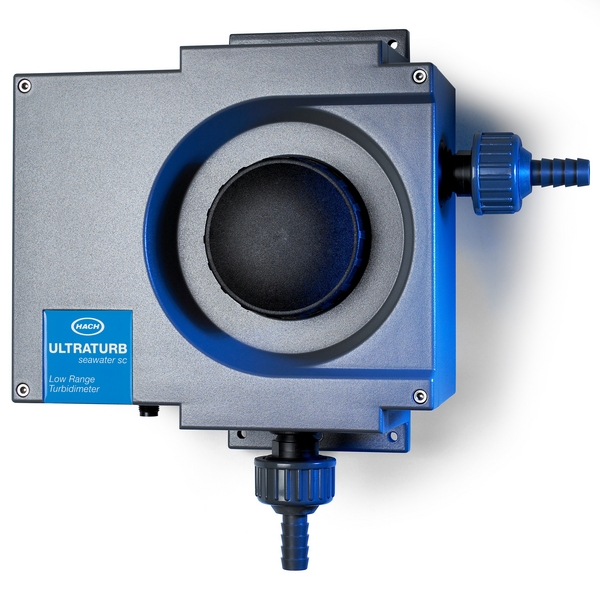海水濁度線上分析儀 Ultraturb seawater sc Turbidimeter
產品編號:LPV415.99.22002
The turbidity bypass sensor that brings clarity
ULTRATURB Seawater sc 線上濁度分析儀符合ISO 7027標準,採用紅外線散射比率法測量原理,在光源90度方向的檢測器和180度方向的參比檢測器連續測量水質濁度,將測量室和視窗的反射影響降低,IR比率技術可對水樣的色度進行補償。
Turbidities in the range of FNU (NTU) 0.0001-1,000 are measured and displayed alphanumerically using a controller. This high resolution facilitates precision differentiation, even for ultra clear liquids. A pulsed, long-life IR radiation source (LED) ensures that costs are minimized.
Designed in accordance with DIN EN ISO 7027 and permanently calibrated before leaving the factory. All key data is set to practical standard values. The instruments are immediately ready for use after connection to the power supply and the supply of sample water. 所有關鍵數據均設定為實用標準值。 分析儀器接通電源並供給水樣後,即可立即投入使用。
The measuring range and all data outputs are modified to suit requirements using menus on the controller.
*使用Hach SC系列 digital controllers 數位控制主機進行監控 - 使用控制器上的選單選取測量範圍和進行所有數據輸出。
All optical and electronic assemblies are installed in housings that are physically very strong and proof against water jets.
Measurement Method 量測方法 : 90° infrared pulse scattered light technique in accordance with DIN EN ISO 7027
Accuracy 精確度 : ± 0.008 FNU ±1% of reading whichever is greater
(0 - 10 FNU)
Range 量測範圍 : 0.0001 - 1000 FNU (TE/F, NTU, FNU) can be programmed as required (0.001-250 EBC = 2500 ppm SiO2) (Note: 1 FNU is equivalent to 1 NTU)
Repeatability 重複性 : ± 0.003 FNU or ± 0.5% of reading (whichever is greater) from 0 - 2 FNU
Response Time 反應時間 : 1 - 60 s (programmable)
Sample Flow Rate : 0.2 to 1 L/min
Calibration Method 校正 : Stablcal
Display 顯示 : Display provided through connection with Hach sc Controller 使用Hach sc系列水質控制器進行監控
Automatic Wiper : Yes
關鍵字 : 海水 濁度 監測, sea water turbidity, 海水濁度
ULTRATURB Seawater sc 線上濁度分析儀符合ISO 7027標準,採用紅外線散射比率法測量原理,在光源90度方向的檢測器和180度方向的參比檢測器連續測量水質濁度,將測量室和視窗的反射影響降低,IR比率技術可對水樣的色度進行補償。
Turbidities in the range of FNU (NTU) 0.0001-1,000 are measured and displayed alphanumerically using a controller. This high resolution facilitates precision differentiation, even for ultra clear liquids. A pulsed, long-life IR radiation source (LED) ensures that costs are minimized.
Designed in accordance with DIN EN ISO 7027 and permanently calibrated before leaving the factory. All key data is set to practical standard values. The instruments are immediately ready for use after connection to the power supply and the supply of sample water. 所有關鍵數據均設定為實用標準值。 分析儀器接通電源並供給水樣後,即可立即投入使用。
The measuring range and all data outputs are modified to suit requirements using menus on the controller.
*使用Hach SC系列 digital controllers 數位控制主機進行監控 - 使用控制器上的選單選取測量範圍和進行所有數據輸出。
All optical and electronic assemblies are installed in housings that are physically very strong and proof against water jets.
Measurement Method 量測方法 : 90° infrared pulse scattered light technique in accordance with DIN EN ISO 7027
Accuracy 精確度 : ± 0.008 FNU ±1% of reading whichever is greater
(0 - 10 FNU)
Range 量測範圍 : 0.0001 - 1000 FNU (TE/F, NTU, FNU) can be programmed as required (0.001-250 EBC = 2500 ppm SiO2) (Note: 1 FNU is equivalent to 1 NTU)
Repeatability 重複性 : ± 0.003 FNU or ± 0.5% of reading (whichever is greater) from 0 - 2 FNU
Response Time 反應時間 : 1 - 60 s (programmable)
Sample Flow Rate : 0.2 to 1 L/min
Calibration Method 校正 : Stablcal
Display 顯示 : Display provided through connection with Hach sc Controller 使用Hach sc系列水質控制器進行監控
Automatic Wiper : Yes
關鍵字 : 海水 濁度 監測, sea water turbidity, 海水濁度
Large measuring range: 0.0001 - 1,000 NTU 寬廣量測範圍
The Hach Ultraturb plus sc Sensor measures turbidity from 0 to 1000 FNU (NTU) for a wide variety of low to medium range turbidity applications. Use it to effectively monitor conventional filtered water processes, effluent water, distribution systems, and elevated tanks where small-sized particulates or air entrapment may be an issue.
The Hach Ultraturb plus sc Sensor measures turbidity from 0 to 1000 FNU (NTU) for a wide variety of low to medium range turbidity applications. Use it to effectively monitor conventional filtered water processes, effluent water, distribution systems, and elevated tanks where small-sized particulates or air entrapment may be an issue.
Self-cleaning Sample Chamber Option 自動清潔水樣室設計
The Ultraturb sensor is available with an automatically self-cleaning sample chamber that guarantees stable measured values. The silicon wiper blades inside the sample chamber are held in place with a magnetic coupling wheel to further keep the sample chamber intact.
The Ultraturb sensor is available with an automatically self-cleaning sample chamber that guarantees stable measured values. The silicon wiper blades inside the sample chamber are held in place with a magnetic coupling wheel to further keep the sample chamber intact.
Suitable for seawater, brackish water, raw water and other applications
The new Ultraturb seawater sc is resistant to salt concentrations up to 65 g/L.
The new Ultraturb seawater sc is resistant to salt concentrations up to 65 g/L.
Ratio Methodology Detects Sample Chamber Fouling
The Ultraturb sensor uses ratio methodology with detection at 90° and 180° to minimize reflections in the measuring cell and on the windows. In this way, fouling of the sample chamber is detected earlier than with a single detection system.
The Ultraturb sensor uses ratio methodology with detection at 90° and 180° to minimize reflections in the measuring cell and on the windows. In this way, fouling of the sample chamber is detected earlier than with a single detection system.

